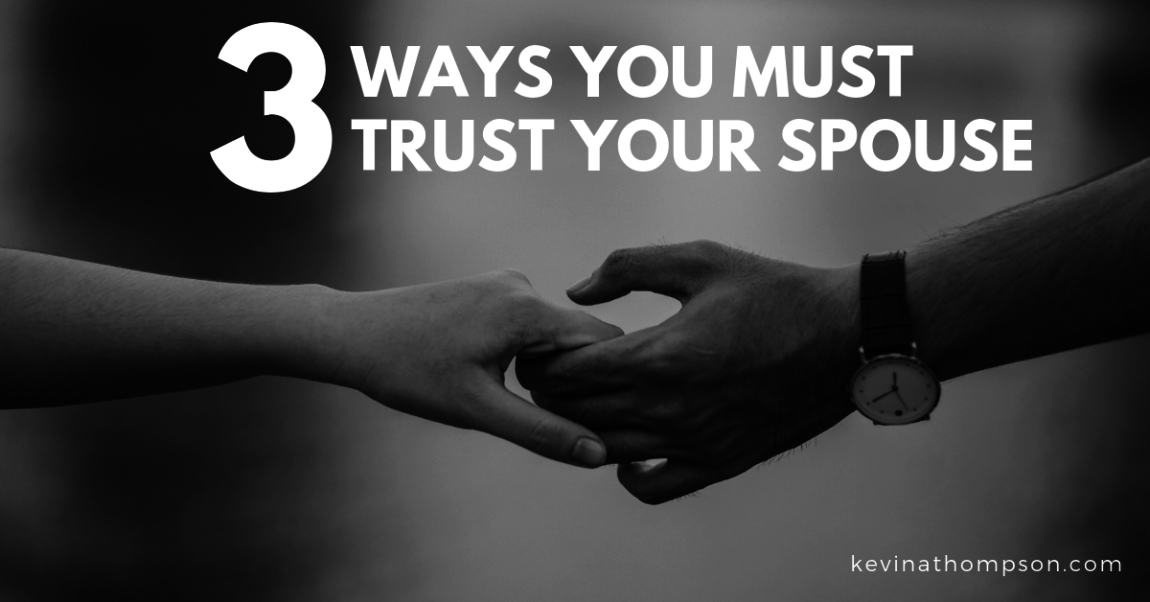Trust changes everything. Where trust is present, two people are able to navigate difficulties, move past differences, and grow from experiences. Where trust is absent, a relationship is dying. It’s easy to flippantly say, “______ is the most important aspect of marriage.” So many issues are fundamental to a healthy marriage–intention, respect, friendship, decency, etc. Without a doubt, trust is on that list. While it may not be the most important element, nothing is more important.
Few things define my relationship with Jenny as much as trust. I know I can rely on her. I have no doubt that in every situation she will act in a way with my best interest at heart. She won’t be perfect, but she will consistently be good.
Three Areas of Trust
For a healthy relationship to flourish, I must trust Jenny in three specific ways:
I must trust her heart. Her heart is the source of her intentions. At the core of who Jenny is, I believe she is for me. Even when a word seems critical, I know her ultimate aim is for my good. When I’m uncertain about a specific action, I’m reminded that she would never intentionally harm me. I must trust her heart in order to feel secure enough to let her into my life.
This enables friendship. When I trust what she does, it encourages me to spend time with her. It motivates me to be with her. When distrust of our spouse’s heart is present, we become skeptical of what they will do, causing us to distance ourselves from them.
I must trust her mind. Her mind dictates the decisions she will make and the words she will use. By trusting her mind, I allow her to speak into my life. I trust her perspective. This trust is evident by seeking her opinion, validating her ideas, and allowing her to influence me in a positive way.
This enables partnership. By trusting what she thinks, we are able to work in equal union toward common goals. When we distrust our spouse’s mind, we stop having an equal relationship. We put ourselves above our partners as we show contempt for them. Yet when we trust the mind of one another, we find common ground and move forward.
I must trust her soul. Her soul ultimately dictates who she is. When I trust Jenny’s soul, it means I don’t fear that there is part of her which I do not know. It means I don’t have to worry about something being suddenly revealed or her acting in a way that’s not predictable. This trust brings great security. When we trust each other’s soul, we experience a safety which allows us to reveal the most intimate details of who we are without fear of repercussion or manipulation.
This enables intimacy. By trusting who she is, I am allowed to let the walls down from around my own heart and soul, revealing my true nature. When we distrust the soul of another, we always wonder if we are dealing with the whole person. (For more, see Friends, Partners & Lovers)
When Trust Is Missing
A healthy relationship requires trust in all three areas. This doesn’t happen overnight. It takes time to fully develop. One of the great privileges of a marriage that spans over the decades is the possibility (not the guarantee) of a deeper level of trust in all three areas. When trust is lacking from any of these three areas, a couple must admit it and do something about it.
However, couples must avoid two common misunderstandings:
When trust is missing from one of these areas, the temptation is to downplay it. Don’t. Trust is not an area where having two out of three right is enough. Distrust in one area can quickly ripple into other areas. If we don’t trust one another in one area, we must do something.
When trust is missing from all of these areas, the temptation is to think the relationship can’t be saved. That’s not true. While a total absence of trust is a dangerous situation for the relationship, it doesn’t guarantee the marriage is over. Left untreated, the absence of trust will destroy the connection. Yet if a couple will take seriously the problems that are present, get help, and do the work necessary, trust can be restored.
Instead of being in denial of the effects of distrust or in despair over a total absence of trust, husbands and wives should recognize the reality of how things are while having hope of what could be. Trust can be built and rebuilt. If it’s never been present, it can be created. If it’s been broken, trust can be recreated. (See: Why Others Don’t Trust You)
The key to establishing trust is consistency, truth, and compassion. Trust isn’t built in an instance. We must be consistent in order to slowly build trust over time. Inconsistency destroys any beginnings of trust. Truth is the foundational building block of trust. Without it, trust can never be built. Lies, manipulations, and deceits erode any hope for trust. But truth alone doesn’t build trust. We also need compassion. Without compassion, we might fear how the other person will use the truth. We might think that they will use it to hurt us. Compassion forces us to use the truth in a way that is in the best interest of one another.




One Response to 3 Ways You Must Trust Your Spouse